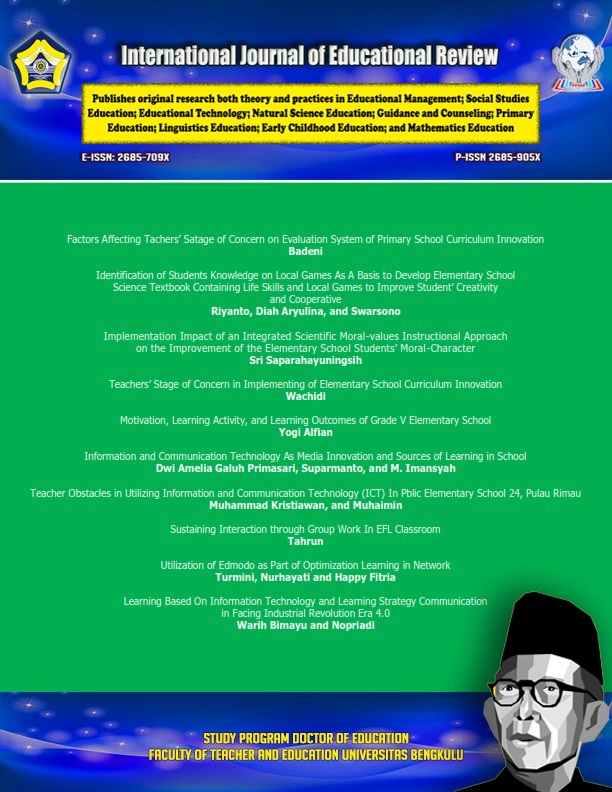Predictive Performance of Pre-service Teachers’ Teaching Techniques in Osun State University
DOI:
https://doi.org/10.33369/ijer.v6i2.33843Abstract
The study compared pre-service teachers’ scores in micro-teaching and teaching practice for three sessions ranging from 2019/2020 to 2021/2022 academic sessions for micro-teaching and 2020/2021 to 2022/2023 academic sessions for teaching practice. The study is an ex-post facto research design because it used the existing data of students’ scores in micro-teaching and teaching practice in the concerned sessions. Four hundred and thirteen (413) pre-service teachers were involved. Data were analysed using frequency count, percentage and correlation analysis. The results showed that students performed well in both micro-teaching and teaching practice with that of micro-teaching on the higher side. It also revealed a positive relationship between pre-service teachers’ performance in micro-teaching and teaching practice across the sessions. The study therefore recommends that teaching exercise should be given more attention in the training of teachers by teacher training institutions while appropriate mechanisms should be designed to attend to the shortcomings realised by pre-service teachers’ supervisors during the teaching practice exercise.
References
Anathe, R. K., Michaela, M., & Daniel, O. (2021). The influence of micro-teaching in enhancing teaching competencies of pre-service teachers: a case of Saint Augustine University of Tanzania. East African Journal of Education and Social Sciences (EAJESS) , 2(1), 11–22.
Anees, A. (2022). Practice teaching of B.Ed. trainees in schools; An analytical study. Journal of Research in Humanities and Social Sciences, 10(2), 01–05.
Arslan, A. (2021). Pre-service Teachers’ Journey of “Teaching” through Micro-Teaching: A Mixed Design Research. Egitim ve Bilim, 46(207), 259–283. https://doi.org/10.15390/ EB.2021.9406
Bada, A. A., & Akinbobola, A. O. (2022). Micro-Teaching and Teaching Practice: A Predictor of Physics Teacher Trainee’s Performance. Indonesian Journal of Science and Mathematics Education, 5(1), 65–76. https://doi.org/10.24042/ijsme.v5i1.10411
Crichton, H., Valdera Gil, F., & Hadfield, C. (2021). Reflections on peer micro-teaching: raising questions about theory informed practice. Reflective Practice, 22(3), 345–362. https://doi.org/10.1080/14623943.2021.1892621
İLYA, A. (2022). A Comparative Analysis of Classroom Discourse in Microteaching and Practice School Contexts. Sakarya Üniversitesi Eğitim Fakültesi Dergisi, 22(2), 111–127. https://doi.org/10.53629/sakaefd.1140040
Kerlinger, F. (1966). Foundations of behavioral research. https://psycnet.apa.org/record/1966-35003-000
Koross, R. (2016). Micro Teaching an Efficient Technique for Learning Effective Teaching Skills: Pre-service Teachers’ Perspective. IRA International Journal of Education and Multidisciplinary Studies (ISSN 2455–2526), 4(2), 289. https://doi.org/10.21013/ irajems.v4.n2.p7
Kris, B. (2020). A short guide to micro-teaching. Www.Thoughtco.Com.
Maseko, N. (2022). Experiences Of Student-Teachers During Teaching Practice : A Critical Analysis And Suggestions As To How They Could Be Better Prepared. Journal Of Education And Teaching Learning (JETL), 4(2), 159–173. https://doi.org/10.51178/jetl.v4i2.730
Mothofela, R. M. (2021). The impact of micro-teaching lessons on teacher professional skills: Some reflections from South African student teachers. International Journal of Higher Education, 10(2), 154–171.
Ode, J. O., Iioakasia, A. O., & Maduka, O. G. (2020). Teacher Education Programme: The Place of Teaching Practice. Practice, Education Rev. Lett, 1–11.
Olusanya, O. O. (2020). Impact of micro-teaching on teaching practice performance of business education students in Federal College of Education, Abeokuta. Nigerian Journal of Business Education (NIGJBED), 7(1), 437–444.
Onah, M. C., Unigwe, J. C., & Okeke, A. C. (2023). Influence of micro-teaching on student performance in teaching practice exercise in Orumba South lga Anambra State. Nnadiebube Journal of Education in Africa, 8(1).
Otsupius, I. (2014). Micro-Teaching: A Technique for Effective Teaching. African Research Review, 8(4), 183. https://doi.org/10.4314/afrrev.v8i4.15
Reddy, C. (2023). Micro teaching principles, procedures, benefits and limitations. Https://Content.Wisestep.Com/Micro-Teaching-Procedure-Benefits-Limitations/.
Reddy, K. R. (2019). Teaching how to teach: Micro-teaching (A way to build up teaching skills). J-GMC-N, 12(01), 65–71.
Sa’ad, T. U., Sabo, S., & Abdullahi, A. D. (2015). Journal of Education and Practice www.iiste.org ISSN (Vol. 6, Issue 26). Online. www.iiste.org
Şen, A. İ. (2009). A Study on the Effectiveness of Peer Microteaching in a Teacher Education Program Akran-Mikro Öğretimin Öğretmen Yetiştirme Programındaki Etkisinin Araştırılması. In Cilt (Vol. 34).
Silas, P. B. D. J. (2023). The teachers we need for the education we want: The Global Imperative to Reverse the Teacher Shortage. 2023 World Teachers Day Organised by the Academic Staff Union of Secondary Schools (ASUSS) Nigeria.
Sofos. A, Darra, M., & Tsarpa, I. (2014). The use of microteaching in the context of Phase I Teaching practice: The Students’ perspective. . Proceedings of the Panhellenic Conference of the Teaching Practice Office on: “Teaching Practice in Higher Education Institutions,” 135–152.
Solanki, M., & Patel, A. (2017). Micro teaching: for the teaching practice performance,. International Journal of Research in All Subjects in Multi Languages, 5(5), 14–17.
Sonmez, D. (2012, October 4). Affects of Microteaching Course on Student Teaching Practice. . Http://Www.Eera-Ecer.de/Ecer-Programmes/Conference/6/Contribution/17309/.
Steiner, A. L., & Lemke, J. (2023). Influential experiences: Practices of teaching and learning successes to increase pre-service teachers’ self-efficacy. Journal of Curriculum, Teaching, Learning an Leadership in Education, 8(1). https://doi.org/10.32873/uno.dc.ctlle.08.01. 1108
Wada, M., & Shimamura, S. (2005). An empirical study for anxiety in using digital media: A reduction in teacher’s anxiety and high-schoolstudents’ anxiety in using digital media. Bull. Cen. Res. Supp. Educ.Pract, 1, 139–147.
Wanja, N. M., & Njagi, M. W. (2018). Prospective Teachers Proclivities in Regard to Teaching Practice as Part of Teacher Training. In International Journal of Innovation and Research in Educational Sciences (Vol. 5, Issue 5). https://www.researchgate.net/publication /374053194
Zulfikar, T., Nidawati, Khasinah, S., & Mayangsari, I. (2020). Indonesian students’ perceived benefits of the micro-teaching course to their teaching internship. Indonesian Journal of Applied Linguistics, 10(1), 242–250. https://doi.org/10.17509/IJAL.V10I1.25063
Downloads
Published
How to Cite
Issue
Section
License

This work is licensed under a Creative Commons Attribution-ShareAlike 4.0 International License.




